

|
Back to |
| The Front Page |
| People |
|
A courtside chat with Jeff Soo of North Carolina |
||||||||
|
Interview by Bob Alman Courtside photo by Jeff Soo; other photos by Larry Kirby Layout by Reuben Edwards Posted November 15, 2014
|
||||||||
|
||||||||
Jeff Soo was a worthy subject for Courtside Chats before he scored big wins in this fall's USCA National Championship (winning American Rules doubles) and the USCA Selection Eights, winning the top Eight. Fresh victories over his main rivals in those tournaments confirms not only his continued excellence as a veteran player, but also the luck of the interviewer. We both appreciate the importance of combining the elements of skill and luck. Thus begins our interview with a top-ranked American player at the top of his game.
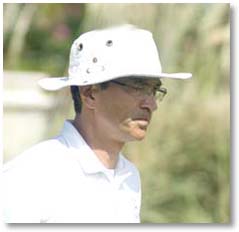
|
JEFF SOO: If it were all about the rankings we'd never have to play tournaments. But your opponents don't care about your ranking, or what you did last week or last year. You have to prove yourself every time. Kudos to Paul for beating me handily.
BOB: Were you prepared to be knocked out of singles so early, having started as the seventh seed in the knockout on the basis of placement from block play?
JEFF: I don't go into a tournament prepared to lose, and I don't care about the seeding after the blocks. But to win a Nationals you need to play well and you need some luck. It wasn't really my week for either, at least in singles. In doubles you have the benefit of a partner to pull you through the rough patches.
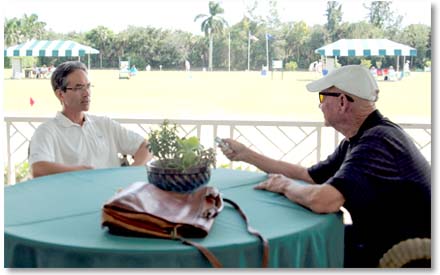
|
| Jeff Soo responds to questions from Bob Alman on the veranda of the National Croquet Center during a lunch break at the USCA Nationals in October. |
BOB: The "rough patches" in top-level American Rules doubles are what makes it such an interesting spectator game for me. Rich Lamm certainly did pull you both through, but surely you deserve some of the credit. Do you enjoy doubles more than singles? Are you aware of special qualities you need to bring to success in doubles, often so messy and interactive?
JEFF: Rich didn't pull me through, we pulled each other through. That's how a successful doubles pairing works. One reason Paul Scott and I were so successful as a doubles team is that we seemed to have the knack of not both playing badly at the same time. Rich and I have had that same formula in test-match doubles, and now we're developing it in American rules doubles as well.
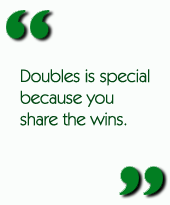 BOB: Your two main partners since you started winning events were Paul Scott, and more recently Rich Lamm. It must be satisfying to play with a partner so well that you want to repeat.
BOB: Your two main partners since you started winning events were Paul Scott, and more recently Rich Lamm. It must be satisfying to play with a partner so well that you want to repeat.
JEFF: Doubles is special because you share the wins. That's also a reason team play is so satisfying. In singles, you're the only one who cares whether you win or lose.
BOB: You must be pleased with your recent performance against your main rivals at the top of the USCA rankings--Danny Huneycutt and Ben Rothman. You defeated Danny in the North Carolina Open this year, and in the Eights you won more games than either and won your block. Although Huneycutt and Rothman are slightly ahead of you in the American Rules handicap standings, I think that's because you play less American Rules than they do, and the system is still weighted to reward winning more than it punishes losing.
JEFF: Danny didn't play the NC Open this year, but I did beat him at the NC State Singles Championship. The American-rules handicap system wasn't designed as a ranking system, and it doesn't make a very good one, but Ben and Danny belong at the top.
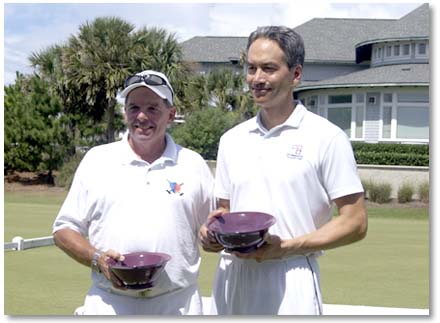
|
| Jeff Soo (right) was the winning finalist against Danny Huneycutt in the 2014 North Carolina State championship. This photo and the other Soo portraits below were all shot at the same event, by Larry Kirby. |
BOB: In the world rankings, you are the second-ranked American, below Rothman, by less than 100 points. Is that significant at all, in a system with more than 2400 points at the top?
JEFF: In the Association Croquet World Ranking, 88 points is not trivial--it predicts that the higher ranked player would win about three out of five. And Ben has consistently been highly ranked ever since his breakthrough at the 2009 Worlds, whereas I'm currently at my all-time high, and it remains to be seen how long I'll stay up there. But I've had some good results this year and of course I'm pleased about that.
|
SOO'S USCA NATIONAL CHAMPIONSHIP RECORD
1998 - first played by Soo, Am Rules Soo has competed in the USCA American Rules Nationals 12 times, reaching the finals in singles eight times (winning five) and the doubles finals eight times (winning six). In that same period, he won the Association Croquet USCA title once in singles and three times in doubles. He won all the doubles championships with Paul Scott through 2008. All the subsequent doubles titles have been won with Rich Lamm.
|
JEFF: Matthew knocked me out of the NC Open this year, in the quarterfinals. He's having a breakthrough year, I'd say. He's clearly a major talent, and if the game holds his interest he'll get a lot better yet and will win a lot of national titles. Will he contend for world championships? I don't know--there's a lot more than talent involved in reaching that level. But I think he has all the necessary attributes.
BOB: You say that while young Matthew is rapidly on the way up, you're at an all-time high. Are you suggesting you can't go higher? At your level, how do make that calculation? I seem to recall that you made it to championship level sort of quickly, yourself, although you didn't start as a kid. When was that?
JEFF: I was 30 when I started playing. I'm not saying I can't go higher; I'm saying it remains to be seen whether or not I do. I know I have the capability. The question is motivation. I don't really practice much any more. I would need to get back to a regular practice schedule, and to do that I would need a definite goal. Goal setting is hugely important if you want to go far in croquet, or in anything. Of course having a goal gets you nowhere by itself; you also need commitment. The reason I haven't improved much in the last 10 years is that I haven't committed to that kind of goal.
|
JEFF SOO'S INTERNATIONAL RECORD
Soo has been selected to the US team for six Solomon Trophies (against the United Kingdom), one Carter Challenge (against Ireland). and four MacRobertson Shields (against the other three major powers in croquet: England, Australia, and New Zealand.)
|
JEFF: No, I've had to learn how to be confident. I had pretty good shots and tactics after a few years, but it took me a couple more years to learn how to win big events.
BOB: Before you can win, you have to BELIEVE you can win, I gather....
JEFF: Yes. And before you can make a big improvement, you have to believe you will get there. There's nothing easier than to prove yourself right about what you think you can't do.
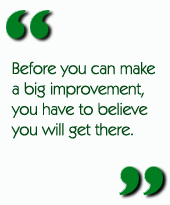 BOB: I think the most amazing story about "belief" as a path to croquet championships is my interview with Mark McInerney, the first non-Egyptian Golf Croquet world champion. Until his dog was killed just a few weeks before he was scheduled to play in the Association Croquet World Championship, Mark was planning on winning that one, too. Mark believed he could win anything. He told me his dog--his best friend--was somehow connected in a way he didn't understand with that will to win. He felt invincible in Golf Croquet, and had reached the semi-finals in Association Croquet a couple of times. But then his dog was struck by a car, and that ended his croquet career, at least for now. Is your SELF-BELIEF as mysterious and as fragile as that, Jeff? Something you have to work on constantly to keep it strong?
BOB: I think the most amazing story about "belief" as a path to croquet championships is my interview with Mark McInerney, the first non-Egyptian Golf Croquet world champion. Until his dog was killed just a few weeks before he was scheduled to play in the Association Croquet World Championship, Mark was planning on winning that one, too. Mark believed he could win anything. He told me his dog--his best friend--was somehow connected in a way he didn't understand with that will to win. He felt invincible in Golf Croquet, and had reached the semi-finals in Association Croquet a couple of times. But then his dog was struck by a car, and that ended his croquet career, at least for now. Is your SELF-BELIEF as mysterious and as fragile as that, Jeff? Something you have to work on constantly to keep it strong?
JEFF: No, I don't own a dog. Seriously, and I'm not making fun of Mark, who's a great guy and I hope will return to the game. Confidence is something you can practice and get better at. But my approach is different—I don't put my confidence in outcomes. My confidence is in my ability to produce good swings under pressure; that's it. Winning a tournament, or even a game, involves too many factors beyond my control.
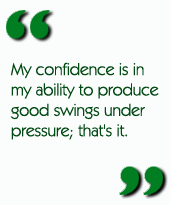 BOB: You got to the Championship level in less than two years. Not bad, but kind of normal for top-level players, I think. I remember being amazed at the speed of San Francisco Croquet Club players in the 80s winning national championships after less than a year of playing--like Rodoni and Taves, for example. But of course, the level of play was not as high then as it is now, and San Francisco was kind of "islanded" with Sonoma-Cutrer in a virtual croquet wilderness, but there was already lots of croquet going on in the Carolinas by the late 90's. You and Mack and Paul were all part of a "shift" from Arizona and California to North Carolina as the "boom" region in USCA croquet, as it still is. And the country clubs in the Western North Carolina mountains are the most remarkable part of that.
BOB: You got to the Championship level in less than two years. Not bad, but kind of normal for top-level players, I think. I remember being amazed at the speed of San Francisco Croquet Club players in the 80s winning national championships after less than a year of playing--like Rodoni and Taves, for example. But of course, the level of play was not as high then as it is now, and San Francisco was kind of "islanded" with Sonoma-Cutrer in a virtual croquet wilderness, but there was already lots of croquet going on in the Carolinas by the late 90's. You and Mack and Paul were all part of a "shift" from Arizona and California to North Carolina as the "boom" region in USCA croquet, as it still is. And the country clubs in the Western North Carolina mountains are the most remarkable part of that.
JEFF: Paul and I had very little to do with developing croquet in North Carolina, other than helping to raise the standard of play. Mack deserves a ton of credit, but there are others too, of course. Mack has been our Johnny Appleseed, traveling across the state and planting the seed. The boom in the southwestern North Carolina mountains is something new, though. The Chattooga club was first, of course, and was very influential back in the early '90s with the Chattooga Challenge, plus the high standard of the lawns. But the boom is very recent, and now there are 10 clubs along a 30-mile stretch of highway 64. All playing mainly or exclusively Golf Croquet.
BOB: And as you know, Golf Croquet, throughout the world, is a mixed blessing. It's great for local clubs and their revenues. But Golf Croquet players in general don't have an incentive to join and renew their memberships in their national association and thus help provide support for the overall growth of the sport. I know this is a subject of concern in the USCA management committee, and the English Croquet Association is very concerned about it, and I wouldn't be surprised if similar alarms are being raised in New Zealand and Australia. Those ten clubs on highway 64 are an ideal testing ground for whatever solutions are being contemplated. What's your take on this issue, which is not just a local or national issue, but a global one for the sport?
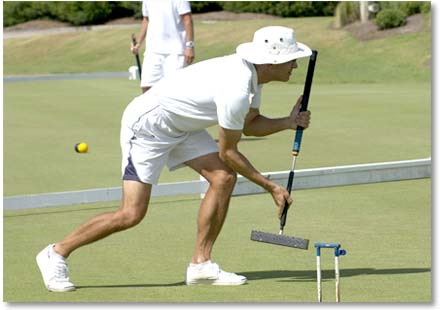
|
JEFF: Golf Croquet is a boon, nothing mixed about it. The health of croquet isn't measured by how many dues-paying members there are, but how much croquet is being played. Golf Croquet has a much broader appeal than Association Croquet or American rules. Maybe if the USCA put more work into development Golf Croquet events we'd get more members. Right now there's very little on the calendar.
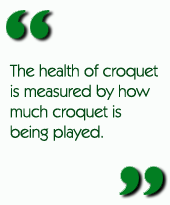 BOB: I have proposed a REAL-TIME video showing a few minutes of top-level Golf Croquet as a sporting spectacle as a potential solution to get that essential message across. Stop-action video or still shots just doesn't do the trick for us.
BOB: I have proposed a REAL-TIME video showing a few minutes of top-level Golf Croquet as a sporting spectacle as a potential solution to get that essential message across. Stop-action video or still shots just doesn't do the trick for us.
JEFF: Good luck with that. Can't hurt, but I don't think we'll ever get much out of mass media. There's nowhere near enough high-level Golf Croquet in this country to live up to any media campaign. You make a flashy video with attractive young people playing impressive shots, and in response you get a few people who come out to learn that actually croquet is, just as they thought, for OLD people.
BOB: Well, as for OLD people, that part of the public perception is correct--and I also have a notion of how to handle that! But the point is that it's mass media that shapes public perception, and public perception is way wrong about the essential nature of the new game we're promoting as the gateway to the sport--Golf Croquet. We have to SHOW the game in real-time to get that point across, one assignment editor at a time. I think maybe you could help with this when the time comes, given your recent forays into the video medium. Two or three days after you won doubles at the USCA American Rules nationals, you posted a very short video showing in stop-action the entire seven-day USCA event. It is surely a stand-alone masterpiece in the limited field of croquet videography--one that should make Duncan Hector envious. What was your intention in creating that video?
JEFF: My intention was to make a funny video. How's that for an artist statement? Time lapse photography is something I started playing with earlier this year. I'd never tried it with croquet, and thought it might be funny, especially with the "miniature" effect you can get with a special type of lens I have. I had seen Mike Orgill shooting time lapse at a croquet tournament a couple of years ago but never saw the result. So this was just experimenting and learning, and trying to come up with a story of sorts as I went along.
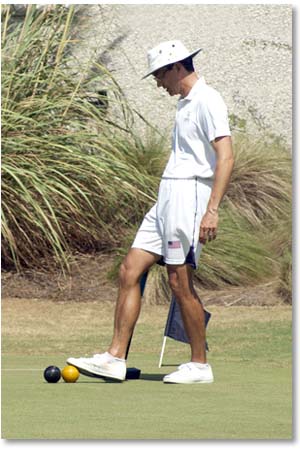
|
JEFF: What I hope is that the viewer will find it funny and strange, enough to watch all the way through, and maybe even watch it again. There are some details that might come out on a repeated viewing. Especially if you watch it full res on something bigger than a phone. As you say it's partly just the effect of seeing something slow at 90 times normal speed, which is the speed of most of the video. At first it looks completely chaotic, but then patterns in the movement start to emerge.
BOB: I know, I've watched it about six times. When you announced it on the Nottingham Board, you commented that some people thought your previous video--of the Solomon Trophy matches on Bald Head Island--was "too slow." That one is almost five minutes long, the music is Ave Maria, and it's in VERY slow motion. But although they both speak beautifully--in opposite moods--to players who already have a background in croquet, I wouldn't like them shown in public media or to the public, because they do nothing to inform people about the sport; in fact they tend to reinforce the false stereotype. Would you agree?
JEFF: Yes, both videos are really only for people already in the know.
BOB: So Jeff, maybe your next video could be a REAL-TIME, continuous action video that tells the media--and therefore "the public"--what we want them to know to promote the new and fast and exciting form of our sport called Golf Croquet. With top players. Is that possible?
JEFF: Well, such a video would have to include Golf Croquet with top players, I agree. But other than live broadcasts (and even that isn't always what it seems), real time isn't apparent on video. And real time Golf Croquet would still look painfully slow on video anyway. Thirty seconds between shots, typical even for top-level players, is an eternity on video. And the public has no concept of the real pace of any of these games. In short, there is no particular value to a real-time video.
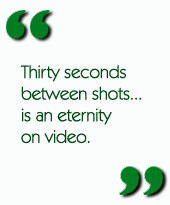 BOB: Maybe when you become president of the USCA you'll be motivated to engage more fully in the "public perception" issue My guess is that you're going to wait until you've passed your peak as a player before investing your players' ego in managing a national organization. Am I right?
BOB: Maybe when you become president of the USCA you'll be motivated to engage more fully in the "public perception" issue My guess is that you're going to wait until you've passed your peak as a player before investing your players' ego in managing a national organization. Am I right?
JEFF: The USCA presidency is an important position for which I lack most of the essential skills, so you haven't got it quite right on the timing. More like never. Eileen and I have put in our time on USCA committees, and we'll continue to do that to some degree. But right now I want to focus on playing well.
BOB: Isn't that what I said--but in a more journalistic way? The truth is that you have ALL the relevant skills, Jeff, and I see this insistent modesty as part of the formula. You do it as a player, and you'll continue to do it as president of the national organization. You remind me of Wayne Rodoni, asked to comment on predictably winning one national title after another. Basically, his answer was some version of "Aw, shucks! I was just lucky." Really? In addition to your sporty modesty, you are still youthful, in good shape, tall, relatively good-looking, and well spoken. All the right public image attributes. Do you really think you can continue to decline to accept that office....say, ten years from now, assuming you've passed your peak as a player by then?
JEFF: No Bob, I'm not modest. If you had asked me a different set of questions that would have been obvious. The USCA presidency combines ceremonial and managerial roles, and these are not things I'm good at, nor interested in. I want to see the USCA thrive, but I have no vision for that other than maintaining the status quo. I want to see US croquet more competitive internationally, and the best thing I can do to that end is to continue to develop as a player. Not because I will necessarily be on the first US team to win the Mac, or whatever the next major achievement is for US croquet, but because the way we develop talent is by pushing each other and learning from each other.
BOB: Okay, that makes sense. The USCA headquarters facility is in Florida, and your home region has for some time been the "happening" place for USCA croquet, with lots of the best players and spectacular club growth in the western mountains. Might North Carolina be a suitable place to relocate the USCA headquarters, should the National Croquet Center fail financially? David McCoy is doing a Herculean job as General Manager, but he is exactly my age--75--and NCC survival is not a done deal at this point.
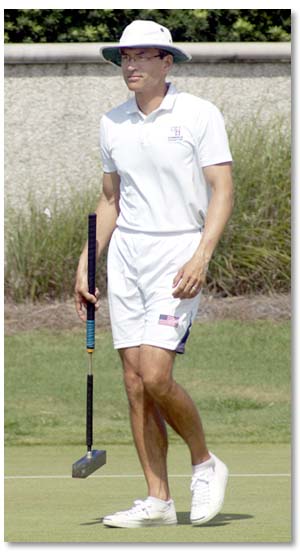
|
BOB: I've had a bit of frustration with it, too! And I also hope very much that it survives, and a lot of people including myself are counting on that. One last question: Most people don't know that my grandfather Alman was a Jew with a medical degree who relocated to rural Alabama from the Carolinas at the end of the 19th Century to establish a town as well as a medical practice. Becoming a Southern Baptist was part of his assimilation. I wonder if you have a parallel story about your ancestry, and how your people came to be in North Carolina?
JEFF: On my mother's side I can trace several lines in North Carolina and Virginia back to the 18th century, and in one case well back into the 17th century, which is to say a generation or so after Jamestown. I suspect that fellow came over as an indentured servant, transported for some minor crime, but that is only a hunch. This side is a mix of English, Swiss, and Germans. Plenty of Baptists, but also some Universalists. My father is a first-generation immigrant, from China, and wound up in North Carolina through a business connection of his father's.
BOB: I think it's time, Jeff, to ask my usual last question: What question would you like to answer which I haven't asked?
JEFF: Well, you haven't asked me about team events, which have been hugely important to me. So, to the question, "Why have team events been hugely important to you?", I'll answer that winning a test match is the biggest thrill there is for me in croquet. Because it's not just about you, it's about your team and all the home fans. It's also where we really learn how to play the game. It's no coincidence that I started winning national championships shortly after I first played in the Solomon and the Mac, and other players have had the same experience. And we bring that knowledge home with us, and spread it around. So supporting the team really is worthwhile, and every aspiring national champion should make it a priority.